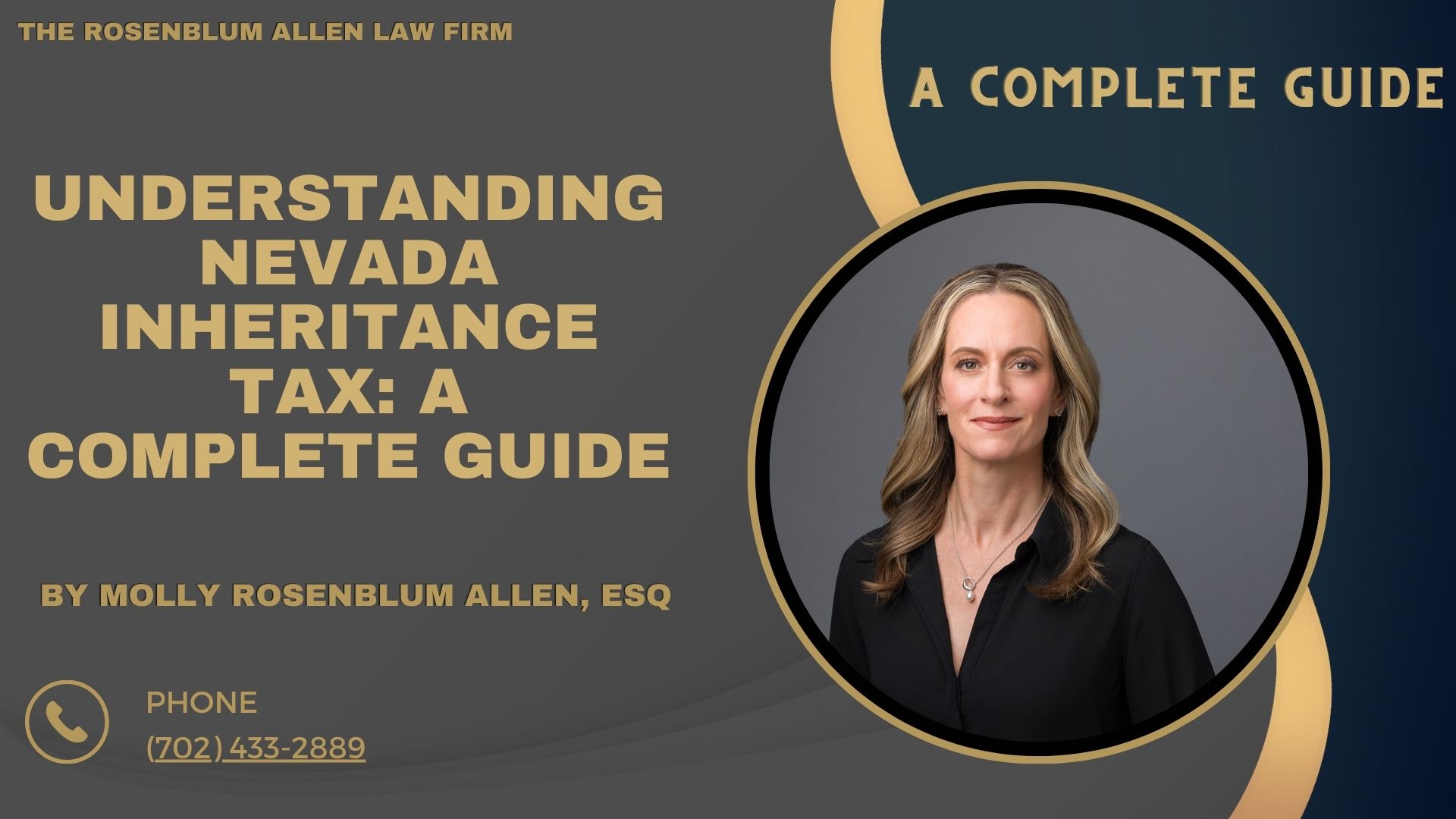When someone mentions Nevada, you might think of its dazzling lights. You might also think of its bustling casinos and vibrant nightlife. But, there’s a more sobering aspect for its residents: inheritance tax and estate planning. It’s not the most thrilling topic. But, understanding Nevada’s stance on inheritance tax is crucial. To safeguard their legacy, anyone must ensure they care for their loved ones. They must consider this key aspect.

Understanding Inheritance Tax
Definition of Inheritance Tax
The beneficiaries are subject to an inheritance tax. They receive property or assets from someone who has passed away. The estate levies a tax before distribution. The person who inherits the property pays inheritance tax.
How Inheritance Tax Differs from Estate Tax and Gift Tax
Estate Tax: Charged on the entire estate before assets are distributed to beneficiaries.
Inheritance Tax: Paid by the beneficiaries after receiving their inheritance.
Gift Tax: Applies to transfers made while the giver is still alive. There are annual exclusions and lifetime exemptions to consider.

Nevada’s Stance on Inheritance Tax
Historical Context of Inheritance Tax in Nevada
Nevada’s tax laws have changed over the years. They mirror wider trends in US tax policy. Nevada has a history of a favorable tax climate. It has no state income tax. This extends to how it handles inheritance.
Current Laws and Regulations Regarding Inheritance Tax in Nevada
Currently, Nevada does not impose an inheritance tax on its residents. This policy makes Nevada good for estate planning. Beneficiaries can inherit property without a state tax on their assets.
Comparison with Other States
Unlike Nevada, several states have an inheritance tax. The rates and exemptions vary widely. This difference is crucial for those considering moving to or from Nevada. It is especially important when planning their estate.

Implications for Nevada Residents
For Beneficiaries Residing in Nevada
Tax Responsibilities and Exemptions
Beneficiaries in Nevada enjoy no state inheritance tax. But, they must still navigate federal tax rules. They also need to understand any exemptions.
Reporting Requirements
There’s no inheritance tax. But, large estates subject to federal tax may need to report. Knowing these requirements is essential for proper compliance.
For Estates of Deceased Nevada Residents
Probate Process and Its Impact on Inheritance Tax
The probate process in Nevada, like in other states, is the court-supervised. It is for distributing a deceased person’s assets. Nevada doesn’t have an inheritance tax. So, probate focuses on title transfers, not tax.
How Estate Size Influences Tax Implications
Estates that might owe federal estate taxes are the ones in question. The size of the estate matters. The taxes apply to large estates. This shows the need for careful planning.

Estate Planning in Nevada
Estate planning might sound like something only the rich need to worry about. But, anyone looking to protect their assets must think of it as a key step. They also want to make sure that others honor their wishes. Nevada has no inheritance tax. You have a unique chance to plan your estate faster. But, that doesn’t mean you should rush without care.
Importance of Estate Planning in Minimizing Tax Liabilities
Nevada residents don’t have to worry about state inheritance tax. But, it’s key to understand how federal taxes can impact your estate’s plan and your beneficiaries. Estate planning can cut tax liabilities. This ensures more of your assets go to your loved ones, not to taxes.
Critical Components of an Effective Estate Plan
An effective estate plan is more than just a will. It’s a comprehensive approach that may include several key components:
Wills and Trusts
Differences and Benefits: A will details how you want your assets distributed, while a trust can provide more control over how and when your assets are passed on.
How They Affect Inheritance Tax: Trusts, in particular, can be a tool for minimizing taxes and avoiding probate, a public and often lengthy process.
Power of Attorney
Definition and Types: This legal document grants someone else the authority to decide on your behalf if you cannot.
Role in Estate Planning: Ensures your financial affairs and health care decisions are in trusted hands.
Health Care Directives
Purpose and Importance: Also known as a living will, it outlines your wishes for medical treatment if you’re incapacitated.
Impact on End-of-Life Decisions: Ensures your health care preferences are known and respected.

Navigating Tax Exemptions and Deductions
Nevada has no inheritance tax. This simplifies some parts of estate planning. But, it’s still crucial to know other tax strategies. They can help your estate and your heirs.
Common Tax Exemptions in Nevada
Nevada offers various tax benefits. They can impact estate planning. This includes no state income tax, which extends to your estate.
Strategies for Maximizing Deductions
Careful planning with a professional can help you use federal tax deductions. These deductions include those for charitable donations. They can reduce your estate’s taxable size.
Role of Charitable Contributions in Estate Planning
Donating to charity is not only a way to give back but also a means to reduce your taxable estate. You can structure charitable contributions in several ways. This can maximize the benefit to the charity and the tax benefits to your estate.

Legal and Financial Assistance
Navigating the complexities of estate planning and tax law can be daunting. Fortunately, resources are available to help Nevada residents through this process.
When to Consult a Tax Professional or Estate Planner
It’s wise to seek professional advice when:
You’re starting the estate planning process.
There are significant changes in your financial situation or family structure.
You must understand the latest tax laws and how they affect your estate plan.
Resources Available to Nevada Residents
Nevada offers various resources for estate planning, including:
State Programs and Services: Information on legal clinics and estate planning workshops.
Online Resources and Tools: Websites that guide creating wills, trusts, and other estate planning documents.

Breaking It All Down
Nevada’s lack of an inheritance tax is a unique advantage. But, effective estate planning goes beyond just taxes. Ensuring that your wishes are honored is important. You take care of your loved ones and protect your legacy. With good planning and resources, you can navigate these waters easily. This will give you peace of mind and secure the future for those you care about most.

Frequently Asked Questions
What happens if a Nevada resident inherits property from another state?
If you inherit property from a state with an inheritance tax, you might be subject to that state’s tax laws. It’s crucial to consult a tax professional to understand your obligations.
Does Nevada impose any gift tax?
Nevada does not have a state gift tax. However, federal gift tax rules still apply. You must file a federal gift tax return if you exceed the annual exclusion amount in a year.
Are life insurance proceeds taxable in Nevada?
No, life insurance proceeds are not subject to federal income tax and are also exempt from state taxes in Nevada.
How are retirement accounts inherited in Nevada taxed?
Inherited retirement accounts, such as IRAs and 401(k)s, are subject to federal income tax upon distribution. Nevada does not impose state income tax on inherited retirement account distributions.
Can charitable donations help reduce my estate’s tax liability?
While Nevada does not have an estate tax, charitable donations can lower the taxable value of an estate for federal tax purposes, potentially reducing or eliminating federal estate tax liabilities.
What is the distinction between probate and non-probate assets in Nevada?
Probate assets require a court process for transfer of ownership and typically include assets owned solely by the deceased. Non-probate assets, like jointly owned property or assets with designated beneficiaries, bypass probate.
Is a will necessary in Nevada if there’s no inheritance tax?
Yes, having a will is essential regardless of tax considerations. A will ensures that your assets are distributed according to your wishes and can facilitate the process for your heirs.
What are some common joint estate planning mistakes to avoid?
Avoiding regular updates to your estate plan, neglecting to designate or update beneficiaries, overlooking the implications of owning property in other states, and failing to account for digital assets in your estate planning.
How can I shield my estate from federal taxes?
Effective estate planning strategies, such as establishing trusts, making charitable contributions, and leveraging gift exclusions, can help minimize federal tax liabilities on your estate.
Where can I access additional resources on estate planning in Nevada?
The Nevada Bar Association and local legal aid groups provide valuable information and assistance with estate planning, including understanding tax implications.

Glossary
Beneficiary: The person or entity designated to receive assets from an estate or trust.
Estate: The total property, assets, and liabilities an individual leaves at death.
Estate Planning: The process of arranging, during a person’s life, for the management and disposal of that person’s estate during the person’s life and after death while minimizing gift, estate, generation-skipping transfer, and income tax.
Estate Tax: A tax levied on an estate based on the value of its assets before distribution to any beneficiary.
Federal Estate Tax: A tax imposed by the U.S. government on the transfer of the estate of a deceased person.
Gift Tax: A tax on transferring money or property to another person while the giver is alive, without receiving something of at least equal value in return.
Inheritance: Assets received from someone who has died.
Inheritance Tax: A tax imposed on individuals who inherit property or assets from a deceased person.
Probate: The legal process through which a deceased person’s estate is properly distributed to heirs and designated beneficiaries, and any debt owed to creditors is paid off.
Tax Exemption: A monetary exemption that reduces taxable income. Exemptions can be granted to individuals or organizations.
Tax Deduction: An amount that can be deducted from an individual’s or entity’s income before it is subjected to tax, thereby reducing the taxable income.
Will: A legal document by which a person, the testator, expresses their wishes as to how their property will be distributed at death and names one or more persons, the executor, to manage the estate until its final distribution.
Trust: A fiduciary arrangement allowing a third party, or trustee, to hold assets on behalf of a beneficiary or beneficiary. Trusts can be arranged in many ways and specify how and when the assets pass to the beneficiaries.

Additional Resources for You
To further support you in navigating the complexities of estate planning and ensure you’re making informed decisions, our lead attorney, Molly Rosenblum Allen, Esq., has meticulously created a suite of additional resources tailored to meet your needs during these pivotal moments. These resources offer guidance, clarity, and practical steps to take in estate planning and management. Here’s a brief overview of what you can find:
- Las Vegas Estate Planning Attorney: Dive deep into the nuances of estate planning within the Las Vegas area, offering a comprehensive look at local legal intricacies. Explore More
- Las Vegas Trust Attorney: Understand the importance of trusts in your estate planning, including how they can protect your assets and benefit your heirs. Learn More
- Tips on Estate Planning: Gather valuable insights and practical tips to make the estate planning process as smooth and effective as possible. Read Tips
- Estate Planning Checklist: Ensure you’ve covered all your bases with a detailed checklist that guides you through the essential estate planning steps. Check It Out
- Making a Will: Discover the critical importance of having a will, how to create one that reflects your wishes accurately and the consequences of neglecting this crucial document. Get Informed
- Estate Planning Services: Explore the range of estate planning services offered by The Rosenblum Allen Law Firm, which are designed to meet the specific needs of Las Vegas residents. See Services
- Estate Planning Mistakes: Learn about joint estate planning pitfalls to avoid, ensuring your estate is managed and distributed according to your wishes. Avoid Mistakes
- Estate Planning Probate: Gain insights into the probate process and how proper estate planning can simplify or even bypass this complex legal procedure. Understand Probate
These resources, curated by Molly Rosenblum Allen, Esq., are here to guide you through your estate planning journey, offering peace of mind that you’re taking the proper steps to secure your legacy and protect your loved ones.

Outside Resources for You
American Bar Association – A comprehensive resource for legal information, including guides on estate planning and inheritance law. Visit Site
National Association of Estate Planners & Councils (NAEPC) – Offers a wealth of information on estate planning, including finding accredited estate planners. Visit Site
FindLaw – Provides a vast library of articles on estate planning, wills, trusts, and understanding inheritance laws. Visit Site
NOLO – Known for its do-it-yourself legal books and software, NOLO has extensive free content on estate planning and related legal topics. Visit Site
WealthCounsel – A professional community of estate planners and attorneys offering resources and insights into estate planning techniques and strategies. Visit Site
ElderLawAnswers – Focuses on elder law and includes resources on estate planning, wills, trusts, and health care directives, especially relevant for older adults. Visit Site
SmartAsset – While primarily a financial planning tool, SmartAsset offers guides and calculators that can help with estate planning and understanding taxes. Visit Site

A Special Message from Our Lead Attorney, Molly Rosenblum Allen, Esq

Dear Reader,
Thank you for exploring the resources. We’ve selected them to help you understand Nevada’s inheritance tax laws. We’ve also included estate planning. We hope you found them insightful. They will help you navigate these key issues.
At The Rosenblum Allen Law Firm, we know that every situation is unique. Navigating estate planning law can be complex. As a team, we are committed to providing personalized and kind legal guidance. It will help you secure your legacy and protect your loved ones.
Please reach out if you are ready to discuss your estate planning needs. Or, if you have questions about the information you’ve encountered. You can call us at (702) 433-2889 to discuss your situation.
Thank you once again for your interest and trust in our resources. We look forward to the opportunity to assist you further.
Warm regards,
Molly Rosenblum Allen, Esq.




